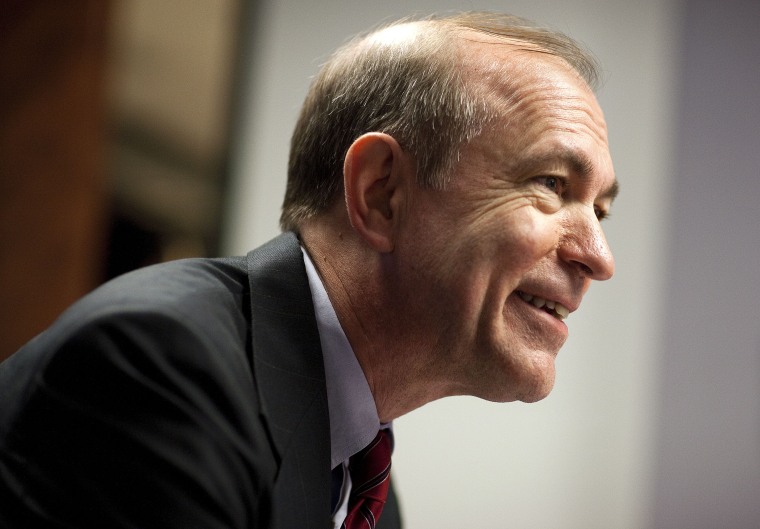Rep. Scott Garrett (R-N.J.) hasn't exactly endeared himself to House Republican leaders. The conservative New Jersey congressman voted against House Speaker John Boehner's (R-Ohio) re-election and recently said
he's refused to pay his National Republican Congressional Committee dues because the NRCC has supported a couple of gay Republican candidates.
Or put another way, Scott Garrett believes his far-right party is simply too friendly towards gay people.
Something interesting happened, however, after this news came to public light. Bloomberg Politics
reported yesterday Garrett is suddenly "facing a revolt by corporate and Wall Street donors."
Earlier this month, in what financial lobbyists said was a sign of things to come, the Big 4 accounting firms and their trade association abruptly canceled a fundraising event for the New Jersey Republican. In addition, Goldman Sachs Group Inc. has decided to stop making political action committee donations to Garrett, people familiar with the matter said. Other firms are likely to follow suit, and some in the industry have debated whether to take a more drastic step and ask for their contributions back from Garrett, said the people, who asked for anonymity so as to not antagonize a lawmaker who oversees their industry. Financial lobbyists have also raised concerns with Republican House leaders, the people said.
Keep in mind, Garrett is on the House Financial Services Committee and chairs the panel on Capital Markets and Government-Sponsored Enterprises. Not to put too fine a point on this, but this is generally a post in which donors from the financial industry trip over themselves, rushing to give guys like Garrett as much money as they possibly can.
But if Bloomberg Politics is correct, Garrett's far-right politics is troubling "some banks and accounting firms, which often tout their diversity as a means of attracting workers and clients."
It leads to an important question: is this the key to combating Republican radicalism?
As GOP politics moves further and further to the right, it's hard not to wonder what, if anything, can cause Republicans to shift closer towards the mainstream and constructive governing. Election results tend not to make a difference, and the party's base certainly isn't going to encourage an ideological overhaul. GOP officials also face no real pressure from the media, much of which is reluctant to even acknowledge just how extreme the party has become by historical standards.
And that leaves one other important contingent within the Republican Party: the folks who write the checks. This
Politico piece from last week jumped out at me.
The U.S. Chamber of Commerce is gearing up to challenge some House Republicans in primary elections, frustrated after much of its agenda has been stymied by a small pocket of conservative GOP lawmakers. The influential and well-heeled business group is already eyeing several races, but the plans are still in their infancy and the targets have not yet been decided upon, according to more than a half dozen Republican sources on K Street and Capitol Hill. The group's apparent new willingness to engage in hand-to-hand political combat to take out sitting Republicans would represent a major shift for the business community, which has largely shied away from targeting sitting lawmakers.
Some skepticism is in order. For one thing, we've seen reports like these before, and there's been little follow through. What's more, to cause a meaningful shift in the GOP's overall direction, it's going to take a broader, more systemic effort than the business lobby targeting a few House members here and there.
There's also the inconvenient detail that there are rival forces -- including the Koch brothers' political operation -- with vast resources pushing in the opposite direction.
That said, it's still a dynamic worth watching. Most Republicans care what the party's donors think, and if Corporate America is telling the party, "You guys are getting a little out of control," many in the GOP are likely to notice.
